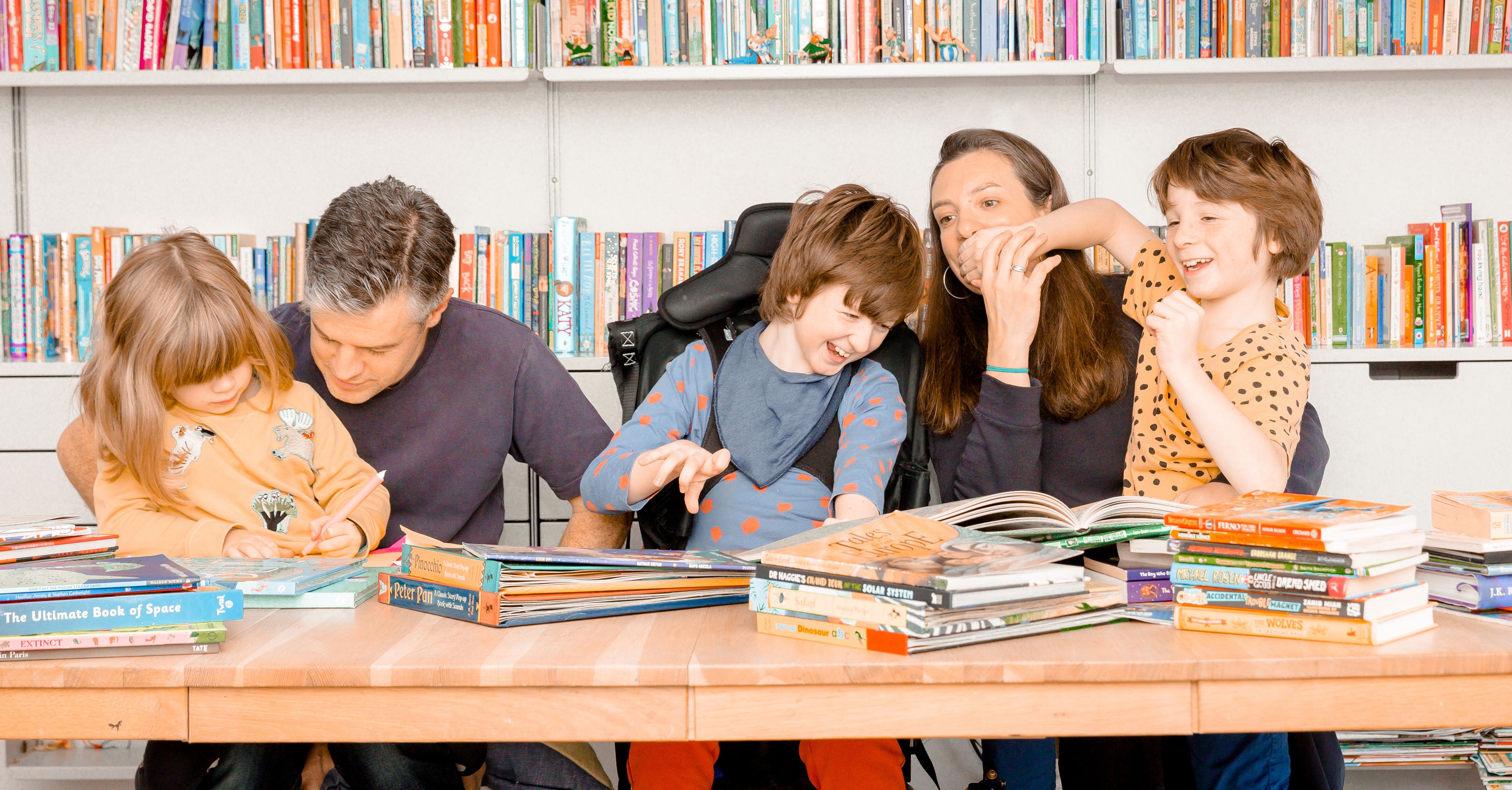
Parent Carer Collective: Jessica Moxham
by Hibi
Oct 25, 2023
Bookish and brilliant, this author and architect has (literally) built a beautiful life around her family.
Jessica Moxham is very good with words. The London-based mother of three is currently studying for a Masters in writing and has already seen her memoir, The Cracks That Let The Light In: What I Learned From My Disabled Son, warmly and gratefully received.
Much of Jessica’s work – including her collection of interviews with fellow parent carers – is inspired by her eldest child, 13-year-old Ben, who has cerebral palsy and, like his mother, is a big-time bookworm.
Along with husband James, 11-year old Max and Molly, who’s seven, the Moxhams live in a home that’s been stylishly modified to meet Ben’s needs. Did we mention Jessica is also a qualified architect?
When we speak, she’s reading Hannah Lowe’s memoir Long Time, No See, watching series two of The Bear with James and, in more family-friendly viewing, enjoying Ghosts with the kids. “It’s like Horrible Histories with adult jokes,” says Jessica. “We all love it.”
Here, Jessica shares her pragmatic approach to caring and some of what she’s learned from her son and others in the disability space.
When we are expecting a child, we usually expect to be their parent, not their ‘carer’. Do you identify as a ‘carer’ to Ben?
Yes, I’m Ben’s carer. I’m not the only one, but it’s a big part of my identity and takes up quite a bit of my time. I don’t know when I first started using the word ‘carer’ – probably when Ben was getting closer to leaving primary school and the difference in what he requires from his parents became quite obviously different to what a typical eight, nine or 10-year-old needs.
There’s no value judgement in Ben needing care, it’s just fact. Sometimes being Ben’s carer means I’m physically helping him, sometimes it means even if other people are with him, I’m organising, sending emails, ordering prescriptions, chasing orders.
What does caring for Ben tend to look like on a day-to-day basis?
Ben needs help with all aspects of his day-to-day life, so we help him move, change, bathe, eat and drink. Ben is tube-fed and we prepare all of his meals at home. He uses a wheelchair and we help him (with hoists) transfer between pieces of equipment. Ben is non-verbal so we interpret his communication – he can eye-point to communicate with us.
Can you compare your initial thoughts and feelings around parenting and caring for a child with disability to how you feel now?
When Ben was born I was totally taken aback by the idea that he would be disabled. It was an extremely intense time – he was tube-fed from birth and we had no experience looking after a newborn of any kind. I just lived day-to-day and learned rapidly. He was a beautiful baby and in many ways it was helpful that we didn’t know what to expect. In some ways we didn’t realise how different he was to a typical baby. I knew almost nothing about disability.
His life since then has been a rapid learning curve for me – getting to know him and what he needs, but also an education in the history and politics of disability. Now, I’m able to accept Ben’s disability as a fact rather than a source of sadness, and I’m not trying to change him.
I would like to change the way people react to him, and lots of other things around the ways disabled people are treated, but Ben himself is thriving and that’s all we want for him. We live good, fun lives that are sometimes frustrating and upsetting, but Ben’s disability is only one part of that.
What do you find most challenging about being a parent carer? And on the flipside, what brings you the most joy?
I still get very worried when he is ill, and I can find it very frustrating not always being able to interpret how he feels or what he needs from me in those moments. I find it challenging that Ben’s disability means we are forced to communicate and navigate having lots of professionals in our lives, and not all of them feel like they’re constructive. I would like to spend more time with Ben, and less time chasing up replies to emails or asking for funding.
I read a lot of books to Ben and him loving and laughing at stories is so joyful to me. He’s loved stories since he was a very small baby and I hope he always will. Ben also loves ice skating, so as we head back into winter in the UK I’m hoping we can fit in a few joyous skate sessions.
‘Self-care’ is a bit of a dirty word in the parent-carer space, as we’re often told to do it and rarely have the opportunity. If you do manage to get an hour or so to yourself, just for you (not chores!), what do you do?
When he was younger, I slept. His sleep has always been disturbed, and I really can’t function on too little sleep. Now, I read or study. With all of the children at school, I’ve been able to go back to university and the opportunity to immerse myself in studying feels like a luxury. It’s the opposite of being needed as a parent or a carer.
What supports have you put around yourself – or do you hope to put around yourself – so you can be your best version of Ben's parent carer?
My husband is a co-parent. He can do everything I can do for Ben, so it doesn’t always have to be me at home. We also have carers who work with Ben and this takes the pressure off us, but also enriches Ben's life. He has funny, interesting, caring people helping him and he really likes them. We’re also lucky to have family in London who help us a lot, either with Ben or the other two kids.
How has your relationship with your husband changed since you became Ben's parents? And how do you two juggle your carer/parent roles between the kids?
I think all relationships change once kids are involved. We had been together a long time – 10 years – before we had Ben and we’d been living abroad for a few years, so we knew each other really well. That means we were able to weather the shock, but the early months were a real challenge. We were able to help each other through it, and I’m not sure I would have survived that period without James.
That said, my career has suffered more than his – partly by choice, partly by circumstance – and we are different people in many ways. Luckily we have similar approaches to parenting and have been able to carve out a way of caring and advocating for Ben which works for us.
What made you decide to share some of your family's story in your book, The Cracks That Let the Light In?
I felt like I hadn’t been able to read enough stories about the feeling of being a parent of a disabled child. I could find accounts of the daily realities, but I wanted to read stories I recognised about how destabilising it can feel to live a life that is nothing like you expected, and how joyful that can be. I really wanted to tell people how my life can be really complex and really happy, all at the same time, and that people don’t need to feel sorry for Ben or us.
It feels strange that I had to have enough space away from caring for Ben to be able to write the book. I could only write it once he had turned 10 because it took me that long to work out what I thought about it all, and I’m always learning.
You interview fellow parents and siblings in the disability space. What are some of the biggest takeaways you’ve gleaned from these conversations?
Even families that look very different from the outside share many common experiences. Having a disabled child is challenging in many ways, and most parents in this scenario have negotiated tricky situations. Their resilience and tolerance are extraordinary. They just keep going, even when it’s hard, and they rarely see their own children as the problem. It’s all the other stuff that's normally the issue.
Follow Jessica's Instagram account and find some of her work on her website.
Let’s clear out the complexities of care. Try Hibi for free here.
Want to share your parent-carer story? We’d love to hear it. Get in touch with our team at hello@hibi.health



